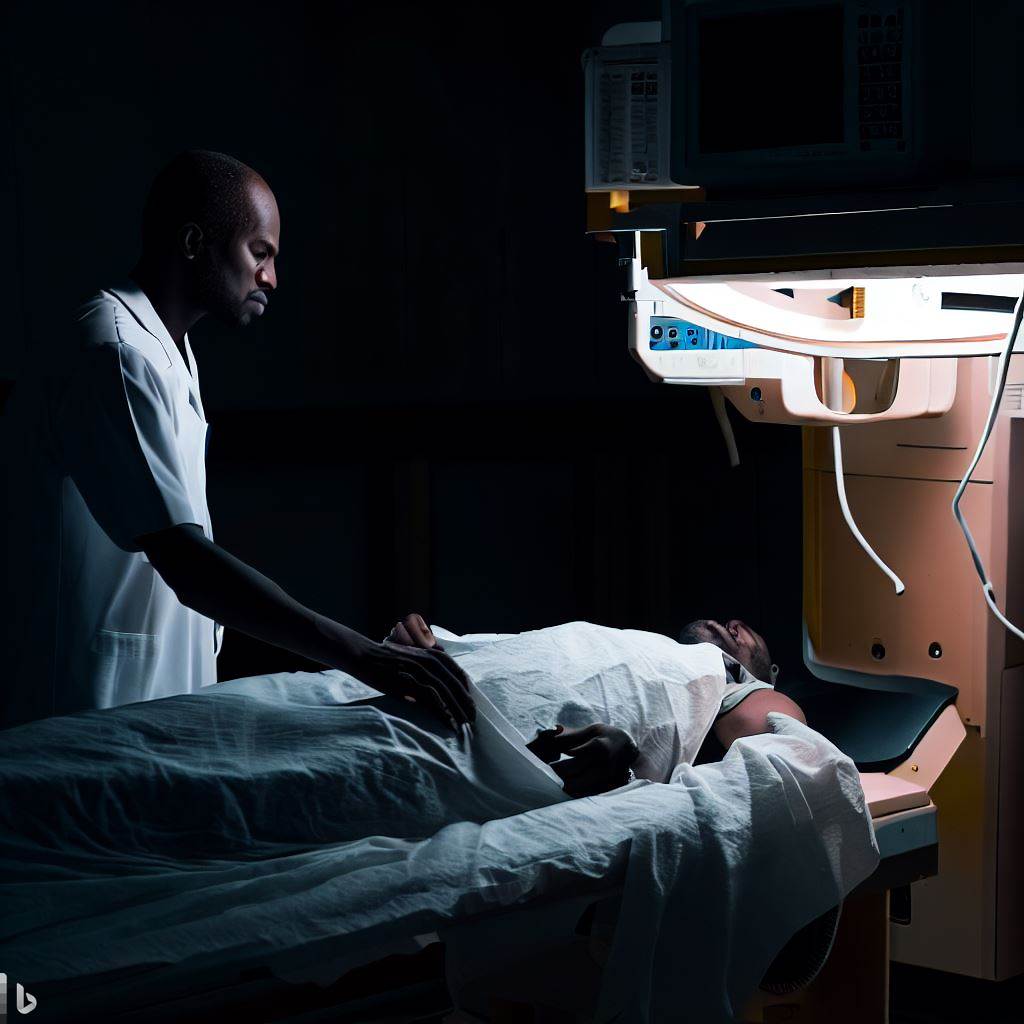Introduction
Radiation therapy plays a pivotal role in cancer treatment, offering effective therapeutic solutions. Nigeria experiences an escalating demand for radiation therapists, highlighting the profession’s significance.
In this section, we underscore the crucial role of radiation therapy in cancer treatment, emphasizing its effectiveness in combating the disease.
Furthermore, we address the burgeoning demand for radiation therapists within Nigeria’s healthcare landscape.
As cancer cases continue to increase, the need for skilled professionals to deliver precise and safe radiation treatments becomes ever more evident.
The discussion sheds light on the growing demand for radiation therapists, showcasing the importance of their expertise in providing optimal care for cancer patients.
Overview of Radiation Therapy
What radiation therapy is and how it works in treating cancer
Radiation therapy is a medical treatment that uses high-energy radiation to target and destroy cancer cells in the body. It works by damaging the DNA of cancer cells, preventing them from growing and dividing.
The main goal of radiation therapy is to shrink or eliminate tumors and relieve cancer symptoms. It can be used as the primary treatment method or in combination with surgery or chemotherapy.
Radiation therapy can be delivered externally or internally, depending on the type and location of the cancer.
External beam radiation therapy is the most common technique used in treating cancer. It involves focusing high-energy radiation beams from a machine outside the body onto the tumor.
This method is non-invasive, and patients typically receive treatment on an outpatient basis.
Another type of radiation therapy is brachytherapy, also known as internal radiation therapy. It involves placing a radioactive source inside the body near the tumor.
The source emits radiation to a specific area, targeting the cancer cells directly. This technique is often used for cancers in sensitive areas, such as the cervix, prostate, or breast.
The different types of radiation therapy techniques used
- Intensity-Modulated Radiation Therapy (IMRT): Shapes beams from various angles, precisely targeting tumors, sparing healthy tissue.
- Image-Guided Radiation Therapy (IGRT): Uses imaging (X-rays, CT) for accurate tumor localization, minimizing healthy tissue damage.
- Stereotactic Radiosurgery (SRS): High-dose radiation treats brain/spine tumors in one session, non-invasive, spares healthy tissue.
- Stereotactic Body Radiation Therapy (SBRT): Targets body tumors, few sessions, precise radiation minimizes organ damage.
- Proton Therapy: Uses protons for precise tumor radiation, reduces impact on surrounding healthy tissue.
- Palliative Radiation Therapy: Eases symptoms, enhances quality of life in advanced cancer patients, manages pain and bleeding.
Basically, radiation therapy plays a vital role in treating cancer by targeting and destroying cancer cells.
With various techniques available, it can be tailored to the specific needs of each patient, offering effective treatment options and improved outcomes.
As the demand for radiation therapists grows in Nigeria, the healthcare industry must address this need to ensure access to quality cancer care for its population.
Read: Nigeria’s Surgical Techs: Striding Towards Better Healthcare
Current Status of Radiation Therapy in Nigeria
Discuss the limited availability and accessibility of radiation therapy centers in the country
- Nigeria faces significant challenges in meeting the growing demand for radiation therapy.
- The number of radiation therapy centers in the country is limited, leading to a shortage of treatment options.
- Most radiation therapy centers are located in major cities, making access difficult for patients in rural areas.
- Patients often have to travel long distances, endure high transportation costs, and face long waiting lists for treatment.
- Limited availability and accessibility of radiation therapy centers pose a significant hindrance to effective cancer care in Nigeria.
Highlight the shortage of radiation therapists in Nigeria
- Severe Shortage: Nigeria grapples with limited radiation therapists, exacerbating therapy accessibility challenges.
- Data Unveils Scarcity: Few qualified practitioners worsen the situation, impacting cancer treatment availability.
- Causes Identified: Lack of training programs, educational opportunities, and migration contribute to the scarcity.
- Brain Drain: Professionals seek better prospects abroad, further depleting the radiation therapy workforce.
- Impact on Care: Shortage hampers treatment delivery, quality, and patient outcomes in Nigeria.
Despite rising cancer cases, Nigeria faces critical radiation therapy availability issues. Few centers, concentrated in cities, restrict rural access and burden patients.
Shortage extends beyond centers to skilled practitioners. Insufficient training options and brain drain deplete the workforce, straining care quality.
Delayed treatment due to therapist scarcity results in patient suffering and compromised recovery. Overworked professionals further compromise care standards.
To alleviate the crisis, Nigeria must establish more centers, develop training programs, and incentivize professionals to stay, ensuring equitable cancer care for all.
Read: What to Expect in a Radiation Therapist Career in Nigeria
Factors Contributing to the Growing Demand
Increase in cancer cases and the need for effective treatment
The first significant factor contributing to the growing demand for radiation therapists in Nigeria is the increase in cancer cases and the need for effective treatment.
With the rise in population and changing lifestyles, the number of cancer patients has been on the rise.
Cancer is a serious health concern that requires specialized care, including radiation therapy.
As more people are diagnosed with cancer, the demand for radiation therapists who can administer radiation treatment and provide patient care is also increasing.
Efficient treatment is crucial in combating cancer, and radiation therapy plays an essential role in this process.
Thus, the growing number of cancer cases necessitates the need for qualified radiation therapists to meet the treatment requirements.
Advances in technology and equipment used in radiation therapy
The second factor contributing to the growing demand for radiation therapists in Nigeria is the continuous development and advancement of technology and equipment used in radiation therapy.
Radiation therapy is constantly evolving, with new techniques and technologies being introduced to improve treatment outcomes.
These advancements require radiation therapists to possess updated knowledge and skills to operate the sophisticated equipment and deliver precise treatments.
The demand for radiation therapists is driven by the need to keep up with technological advancements and utilize cutting-edge equipment effectively.
These therapists play a critical role in administering radiation therapy accurately and safely, ensuring positive patient outcomes.
Awareness campaigns promoting early cancer detection and treatment
The awareness campaigns promoting early cancer detection and treatment have contributed to the growing demand for radiation therapists in Nigeria.
Increased awareness about cancer symptoms, regular screenings, and early detection has led to more individuals seeking medical attention at an early stage.
This, in turn, increases the need for radiation therapists to provide timely and effective treatment.
Early detection of cancer allows for better treatment outcomes and higher chances of survival.
Consequently, the demand for radiation therapists to administer radiation therapy as part of the treatment plan has significantly increased.
Additionally, awareness campaigns also emphasize the importance of regular check-ups post-treatment, thereby contributing to an ongoing demand for radiation therapists in follow-up care.
Essentially, the growing demand for radiation therapists in Nigeria can be attributed to various factors.
The increasing number of cancer cases and the need for effective treatment drive the demand, while advances in technology require therapists with updated knowledge and skills.
Furthermore, awareness campaigns promoting early cancer detection and treatment result in a higher requirement for radiation therapists.
As the demand continues to grow, it is imperative to invest in training and education to meet the needs of cancer patients and improve their treatment outcomes.
Read: Skills Needed to Succeed as a Surgical Tech in Nigeria

Importance of Radiation Therapists
- Crucial Role: Radiation therapists are integral to cancer treatment, tailoring plans and operating radiation machines.
- Analytical Skills: They need strong critical thinking, understanding radiation physics, biology, and advanced equipment.
- Targeted Training: Specialized in techniques, equipment, and staying current with radiation therapy advancements.
- Impactful Care: Therapists enhance patients’ lives emotionally, minimize healthy tissue damage, and collaborate with oncologists.
- Expertise Benefits: Treatment success, survival rates rise; therapists manage side effects, educate patients, ensuring comprehensive care.
Radiation therapists in Nigeria significantly impact cancer treatment, enhancing outcomes through their expertise, tailored plans, precise delivery, and supportive care.
Read: Government Policies Impacting Radiation Therapists in Nigeria
Career Opportunities for Radiation Therapists in Nigeria
- In-demand Career: Radiation therapy’s popularity grows, fueled by rising cancer cases and patient needs.
- Rising Demand: Cancer prevalence leads to increased opportunities and job stability for radiation therapists.
- Advancements Matter: Evolving medical tech spurs field growth; radiation therapists play pivotal roles.
- High Projected Growth: Field expansion, demand, and shortage translate to promising career prospects.
- Diverse Opportunities: Radiation therapists can specialize, earn certifications, and assume leadership roles.
- Specialization Paths: Brachytherapy, stereotactic radiosurgery, dosimetry, and treatment planning offer unique avenues.
- Enhanced Credentials: Advanced training boosts earnings; management positions and research roles beckon.
- Contributing to Progress: Clinical trials, innovative techniques, and international work open doors for growth.
- Teaching Potential: Radiation therapists can educate future healthcare professionals, passing on expertise.
In essence, radiation therapy in Nigeria assures fulfilling careers, fueled by demand, specialization, and opportunities for growth.
Steps to Pursue a Career as a Radiation Therapist
Explain the educational requirements and prerequisites
- Obtain a high school diploma or equivalent.
- Research and choose an accredited radiation therapy program.
- Complete the required coursework, including anatomy, biology, physics, and radiation therapy principles.
- Gain hands-on experience through clinical rotations or internships.
- Consider pursuing advanced degrees or certifications to enhance career prospects.
Becoming a radiation therapist requires a strong educational foundation, including a high school diploma or equivalent.
However, it is essential to research and select an accredited radiation therapy program to ensure the proper training and knowledge for this profession.
The coursework usually covers subjects like anatomy, biology, physics, and radiation therapy principles, providing a solid understanding of the field.
Additionally, gaining practical experience is crucial for aspiring radiation therapists. Many programs offer clinical rotations or internships, allowing students to apply their theoretical knowledge in real-world settings.
These opportunities help develop essential skills and provide connections within the industry, which can be valuable when entering the job market.
For those seeking advancement or specialization, pursuing advanced degrees or obtaining additional certifications can be advantageous.
Advanced degrees, such as a master’s or doctorate in radiation therapy, can open doors to leadership positions or research opportunities.
Similarly, obtaining certifications in specialized areas, such as pediatric radiation therapy or advanced imaging techniques, can enhance career prospects and demonstrate expertise in a specific field.
Discuss the licensing and certification process
- Graduate from an accredited radiation therapy program.
- Apply for state licensure by meeting the specific requirements set by the state board.
- Pass the national certification examination administered by the American Registry of Radiologic Technologists (ARRT).
- Maintain licensure and certification through continuing education and renewal processes.
After completing an accredited radiation therapy program, individuals must obtain a license to practice in their state.
Licensing requirements vary by state, so it is important to familiarize oneself with the specific regulations set forth by the state board.
This typically involves submitting an application, providing proof of education, and paying any applicable fees.
In addition to licensure, radiation therapists are encouraged to obtain national certification.
The American Registry of Radiologic Technologists (ARRT) offers certification in radiation therapy, which is recognized throughout the country.
To become certified, individuals must pass a rigorous examination that assesses their knowledge and skills in the field. Certification demonstrates a commitment to professionalism and can enhance job prospects.
Maintaining licensure and certification is an ongoing process that requires participation in continuing education activities.
Radiation therapists must stay updated with the latest advancements and techniques in their field. Continuing education ensures that professionals provide the best possible care to their patients and meet the evolving standards of the industry.
Renewal processes, including the completion of continuing education credits, are typically required every two years.
Highlight the importance of continuous professional development
- Attend conferences, workshops, and seminars to stay updated on advancements in radiation therapy.
- Participate in research projects or publish papers to contribute to the field.
- Join professional organizations like the American Society of Radiologic Technologists (ASRT) to network and access resources.
- Consider pursuing advanced certifications or degrees to expand career opportunities.
Continuous professional development is essential for radiation therapists to stay at the forefront of their profession.
Attending conferences, workshops, and seminars allows professionals to learn about the latest advancements, techniques, and research in radiation therapy.
This knowledge can enhance their skills, improve patient outcomes, and contribute to the growth of the field.
Participating in research projects or publishing papers is another way radiation therapists can contribute to the field.
Conducting research helps advance knowledge and understanding, while also promoting professional growth.
Sharing findings through publications allows other professionals to benefit from new insights and encourages collaboration within the industry.
Joining professional organizations, such as the American Society of Radiologic Technologists (ASRT), provides access to valuable resources and networking opportunities.
These organizations offer educational materials, career support, and a platform for professionals to connect and exchange ideas.
Networking with peers and industry experts can lead to job opportunities, mentorship, and continued learning.
Considering advanced certifications or degrees can open doors to expanded career opportunities.
Pursuing specialized certifications in areas like dosimetry or quality management can showcase expertise and increase employability.
Advanced degrees, such as a master’s or doctorate, can lead to roles in research, academia, or leadership positions within the field.
By following these steps, individuals can pursue a career as a radiation therapist in Nigeria, contributing to the growing demand for this imperative healthcare profession.
Challenges and Potential Solutions
Lack of Awareness about Radiation Therapy as a Career Option
- Many individuals in Nigeria are not aware of the potential career opportunities in radiation therapy.
- Public awareness campaigns should be initiated to educate and inform people about the field.
- Schools and colleges can introduce career counseling programs to highlight radiation therapy as a viable option.
- Collaboration with professional associations to organize seminars and workshops can also increase awareness.
Need for Increased Investment in Infrastructure and Training Programs
- Nigeria lacks the necessary infrastructure and equipment for effective radiation therapy treatment.
- Government and private sector investment is essential to upgrade existing facilities and build new ones.
- Training programs should be developed to ensure a skilled workforce capable of operating advanced radiation therapy technology.
- Partnerships with international institutions can provide technical expertise and funding for infrastructure development.
Importance of Collaboration between Healthcare Institutions and Educational Providers
- Close collaboration between healthcare institutions and educational providers is crucial for the growth of radiation therapy in Nigeria.
- Healthcare institutions should actively participate in curriculum development and provide practical training opportunities for students.
- Educational providers should align their programs with industry needs and update their curriculum regularly.
- Joint research projects and exchange programs can foster collaboration and knowledge sharing between the two sectors.
In a nutshell, addressing the challenges faced in the growing demand for radiation therapists in Nigeria requires targeted efforts.
Improving awareness about radiation therapy as a career option, increasing investment in infrastructure and training programs, and fostering collaboration between healthcare institutions and educational providers are key steps towards meeting the demand.
By taking these measures, Nigeria can ensure a qualified and skilled workforce to provide high-quality radiation therapy services to its population.
Conclusion
The growing demand for radiation therapists in Nigeria has been highlighted throughout this blog.
It is crucial to address the shortage of radiation therapy professionals for the benefit of cancer patients.
Therefore, individuals should strongly consider pursuing a career in radiation therapy to meet this demand and make a difference in the lives of patients.
The escalating demand for radiation therapists in Nigeria signifies a critical need for advanced cancer care.
As the nation confronts the rising burden of cancer, radiation therapists will play an indispensable role in delivering precise treatments and improving patient outcomes.
The synergy between technological advancements and specialized expertise positions radiation therapists at the forefront of modern healthcare solutions. By embracing this field, aspiring professionals have a unique opportunity to contribute to a healthier Nigeria while pursuing a fulfilling and impactful career.
As the healthcare landscape continues to evolve, radiation therapists stand poised to address the pressing needs of patients, reinforce medical infrastructure, and shape a brighter future for cancer care in the country.




